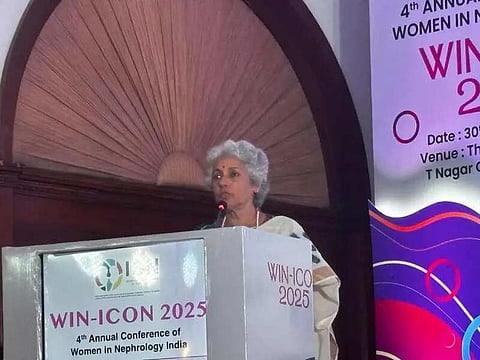

In the 1990s, Vasundhara Raghavan witnessed her 15-year-old son battle kidney failure—an ordeal that inspired her to write guides for patients and advocate for better awareness. Today, as chair of the Kidney Warriors Foundation, a network of 5,000 patient families, she leads prevention campaigns in schools. “Kidney failure is often linked to diabetes and hypertension, both driven by high-fat and high-sodium diets. Teaching children to cook healthy, low-fat meals can prevent future cases,” she said.
Stories like hers shaped WIN-ICON 2025, the fourth annual meeting of Women in Nephrology (WIN) India, held in Chennai on August 30. The event drew nearly 300 doctors, patient advocates, and students from across India and abroad.
The conference focused on prevention while addressing how social, economic, and environmental factors disproportionately affect women. What began as a WhatsApp group of nephrologists has now evolved into a national platform for research, advocacy, and collaboration.
Doctors at the event highlighted the growing burden of kidney disease. Dr. Jayalakshmi S, nephrologist at Rajiv Gandhi Government Hospital, shared that a screening camp in suburban Chennai revealed many asymptomatic women with hypertension, diabetes, and proteinuria—a condition where protein leaks into urine.
Former WHO Chief Scientist Dr. Soumya Swaminathan noted that women working in salt pans, fisheries, and farms face high risks from heat and dehydration. She also emphasized how non-communicable diseases (NCDs) have become India’s leading cause of death, adding that risk factors like indoor air pollution from biomass burning can be reduced by switching to cleaner cooking fuels.